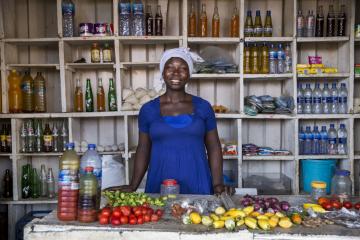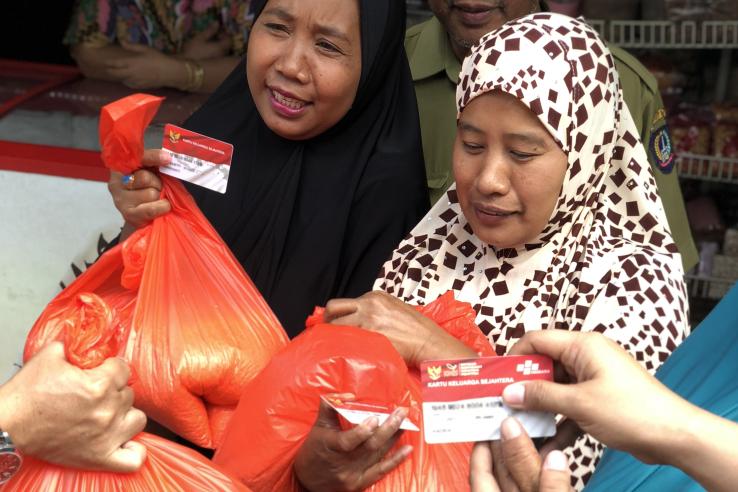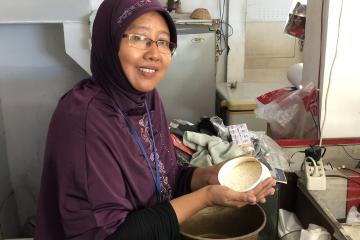
Introducing J-PAL’s new Social Protection Initiative and sector

This week, we are launching a brand new sector and initiative at J-PAL to generate rigorous evidence on the effectiveness of social protection programs and to help partners apply evidence to high-level decision-making.
Social protection refers to policies and programs that provide financial assistance to low-income families, insure against shocks, and break poverty traps. Over the past few decades, these programs, such as cash transfers, “workfare” programs that require those receiving benefits to participate in work or job training, and social insurance programs like unemployment benefits, have become widespread tools to reduce poverty and inequality. After the Covid-19 crisis hit, these programs gained even more traction. As of May 2021, 222 countries or territories had planned or implemented a total of 3,333 social protection measures in response to the pandemic.
Low- and middle-income countries have become a significant part of this story as they increasingly adopt social protection schemes. Designing programs for these contexts, however, entails challenges that differ from those faced in higher-income economies. For example, some standard approaches used to target benefits in wealthier countries are not feasible in lower-income contexts, where informality and self-employment are widespread and information about people’s need for assistance is limited.
There have been recent advances in social protection research within low- and middle-income countries. However, as governments around the world continue to develop their social protection systems, more robust and rigorous research on the most effective forms of program design and implementation is needed to answer key questions, such as:
- How can governments design systems that provide assistance both in non-crisis times and when emergencies hit?
- Will the rise of digital technology and mobile payments change options for reaching those in need of assistance and program implementation?
- Can the type of assistance delivered be customized to the different needs of different beneficiaries?
- Do social protection programs promote social cohesion and connect low-income households to state institutions?
- What design features of social assistance programs promote gender equality?
- How can social insurance help individuals cope with risks related to climate change?
J-PAL and EPoD’s Social Protection Initiative
In response to this need, J-PAL will foster the generation of rigorous evidence on social protection through the new Social Protection Initiative (SPI), a collaboration with Evidence for Policy Design (EPoD) at the Harvard Kennedy School.
Through a competitive research fund, SPI will support randomized evaluations of social protection programs in low- and middle-income countries and engage decision-makers to share policy lessons from completed research.
SPI is co-chaired by Rema Hanna and Ben Olken and supported by the Australian Government through the Department of Foreign Affairs and Trade. The initiative will work to identify and evaluate innovations in social protection by:
- Reviewing evidence on social protection: J-PAL and EPoD will produce an evidence review on social protection in low- and middle-income countries to not only synthesize existing research but also identify important evidence gaps.
- Rigorously evaluating innovative programs to improve social safety nets: SPI will host funding competitions open to the combined network of over 260 J-PAL and EPoD affiliated professors and their collaborators to support rigorous impact evaluations of social protection programs.
- Supporting policymakers in using research results to inform investments in social protection: J-PAL and EPoD’s policy and research teams seek to work with governments, multilaterals, companies, and funders to ensure that effective approaches are promoted and scaled.
Launching the Social Protection sector
SPI will be managed within J-PAL’s new Social Protection sector. Sector co-chairs, Rema Hanna and Ben Olken, and staff will work to identify policies effective at providing financial assistance to low-income families, insuring them against shocks, and breaking poverty traps.
In addition to funding randomized evaluations of innovations in social protection through SPI, the team will synthesize general lessons emerging from the research and support scale-ups of the most promising and effective approaches.
The establishment of the Social Protection sector builds on the important contributions of J-PAL affiliates to research in this field over many years. Some examples of such work include:
- In Indonesia, J-PAL affiliates Abhijit Banerjee, Rema Hanna, and Ben Olken, with coauthors Elan Satriawan and Sudarno Sumarto, evaluated the impact of changing the delivery of a food assistance program from in-kind transfers to electronic vouchers on household welfare. The reform increased the subsidies received by eligible households due to better targeting and decreased poverty by 20 percent among the lowest-income households.
- Several J-PAL affiliates have studied the impacts of cash transfers with variations in program delivery and design. For example, J-PAL affiliates Edward Miguel and Paul Niehaus, with coauthors Dennis Egger, Johannes Haushofer, and Michael Walker, found that unconditional cash transfers increased consumption for both recipients and non-recipients in Kenya, suggesting that transfers may foster local economies by impacting more than the direct beneficiary. Other studies have shown that the timing and type of cash transfer matter: in Colombia, J-PAL affiliates Marianne Bertrand and Leigh Linden, with coauthors Felipe Barrera-Osorio, Francisco Perez-Calle, and Juan Saavedra, found that postponing some payments of conditional cash transfers to a large lump sum paid at the time of school re-enrollment increased enrollment in both secondary and tertiary institutions.
- Evidence suggests that biometric authentication can also improve the delivery of social assistance programs. In India, J-PAL affiliates Karthik Muralidharan, Paul Niehaus, and Sandip Sukhtankar found that a biometric payment system reduced delays in social protection transfers and decreased leakages cost-effectively without excluding vulnerable households.
While these studies, and others from the J-PAL network, have made significant contributions to the design and delivery of social protection programs, evidence gaps such as those listed above remain. More research on social protection in lower-income economies will be critical as governments continue to develop these systems.
What’s next?
The Social Protection Initiative launched its first request for proposals (RFP) this month. We are excited to support rigorous research projects at a time when governments seem particularly open to improving their social protection systems. Learn more about our RFP and sign up to receive occasional updates on future publications and events.
Related Content

Designing financial services and social protection programs to enhance women’s economic empowerment

Community-based targeting to combat Covid-19-induced poverty




